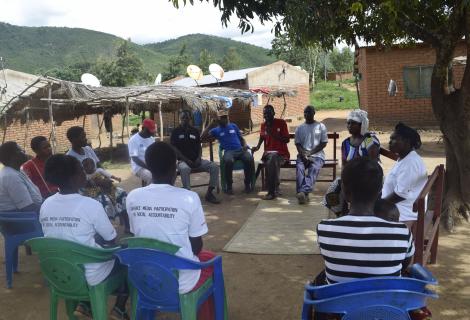Reclaiming rights through RAC

Social Accountability Project improves lives for Rumphi communities
When Eggie Banda, 37, fell ill in February 2016, she feared for her life. The health facility in her area, Mzokoto Health Centre in Chinyolo Village, T/A Mwankhunikila, Rumphi District, always disappointed her.
Every time she visited the health facility for treatment, health workers at the facilities would simply diagnose the disease and prescribe medicines for her to buy from private traders.
“I had no courage to ask why there were no medicines at the facility as I regarded myself not worthy asking such questions to authorities. I thought all those working in public sectors such as health, education, agriculture and transport were simply doing us a favour,” says Eggie, a single mother of four children.
However, the coming in of a European Union (EU)-funded Social Accountability project by ActionAid Malawi (AAM) in partnership Civil Society Agreement Network (CISANET) in the area changed Eggie’s take on governance.
Launched in 2016, the project came to, among others, address limited knowledge among citizens on governance and accountability processes in Malawi’s four districts of Rumphi, Mchinji, Phalombe and Nsanje.
One key structure established under the project was the Reflect Action Cycle (RAC) a grassroots governance committee with membership from village development and area development committees to conduct budget and public expenditure tracking (PET) in the communities.
Eggie, a member of Mzokoto village development committee (VDC) joined Mkozoto RAC and, since then, her knowledge in governance has only improved. A total of 19 more members under Mzokoto RAC gained knowledge in governance through a series of training offered by ActionAid and CISANET.
“As Mzokoto RAC, we meet every Thursday to discuss governance issues affecting our area. One issue I brought up during one of our meetings was the limited availability of drugs at Mzokoto health facility.
Following the meeting, we approached the health advisory committee of the area and together, we agreed to be conducting routine monitoring of the delivery, availability and use of drugs at the health facility. I am pleased to note that since we started conducting the exercise, the availability of drugs has improved at the health facility,” says Eggie, beaming with relief.
Eggie adds that using the same PET skills acquired through the project, Mzokoto RAC has influenced improvement service delivery in other sectors of education, agriculture and transport.
Apart from Mzokoto, the project instituted RAC at Katowo, in TA Katumbi; Chinyolo in TA Mwankhunikira and Zowo and Mlowe South in TA Mwamlowe to entrench a culture of social accountability in the use of public resources. There are a total of 25 RAC in each district of Rumphi, Phalombe, Mchinji and Nsanje where the project was implemented.